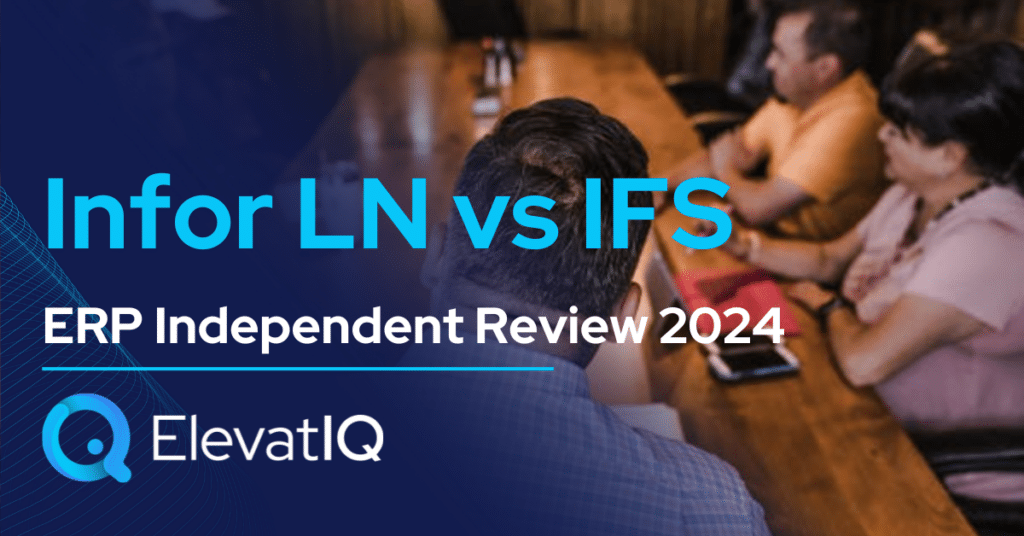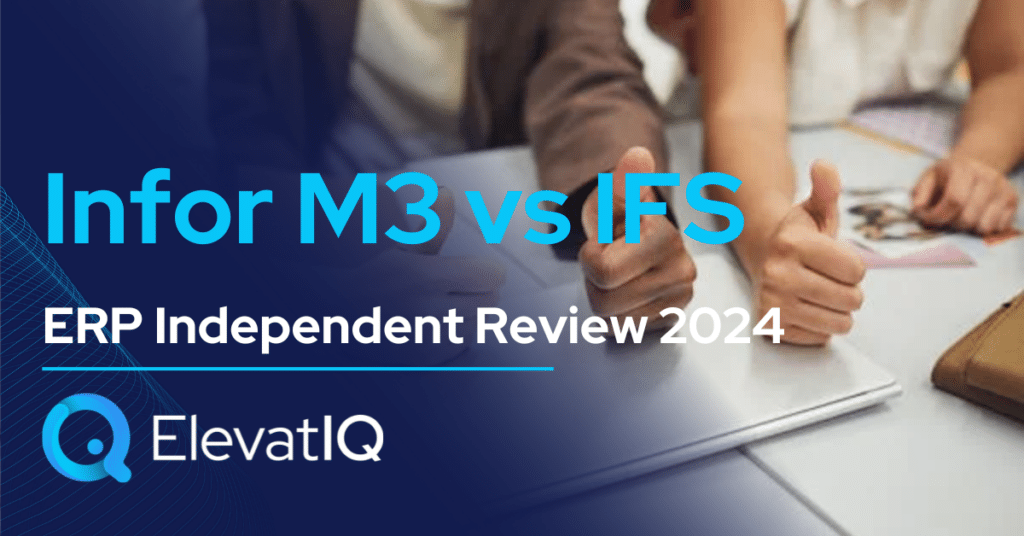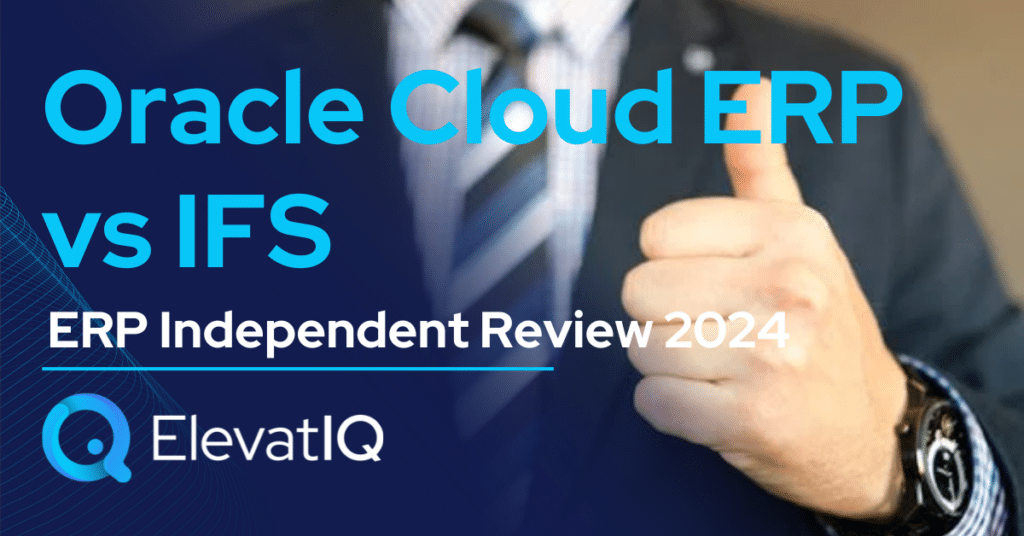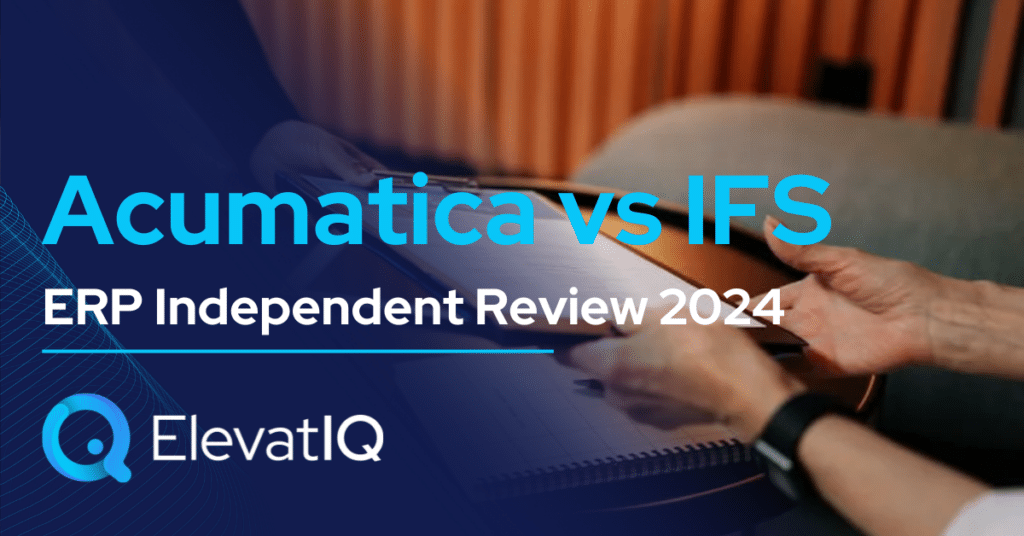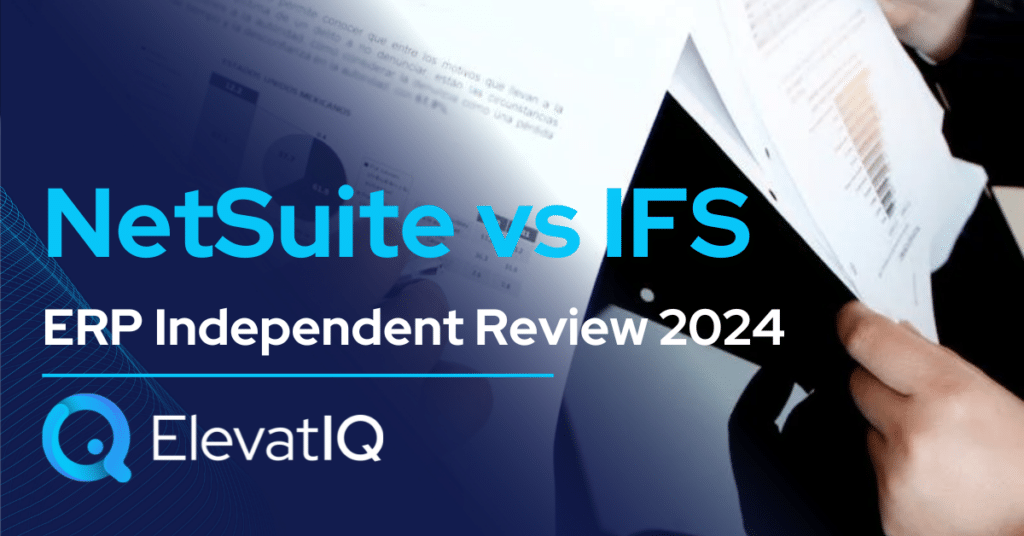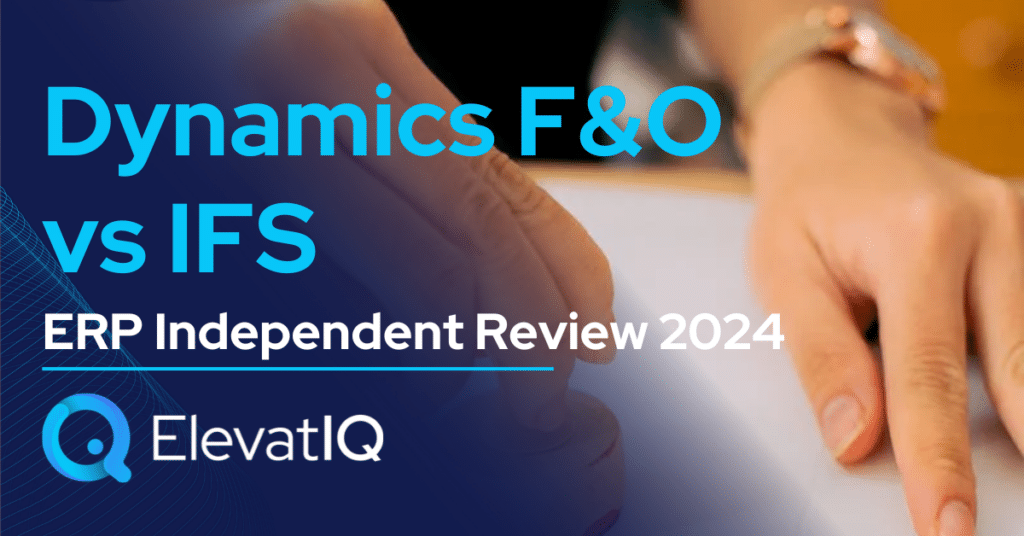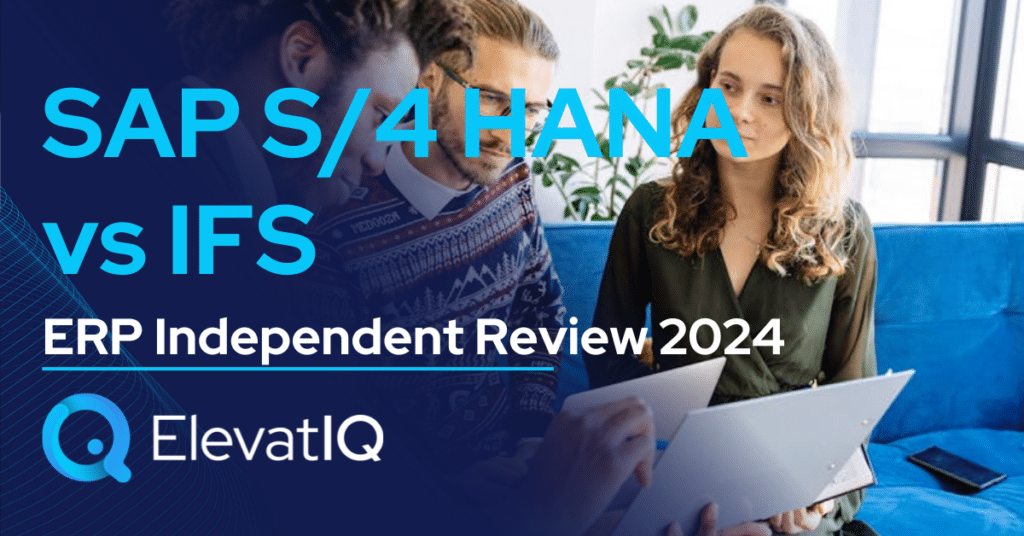Infor LN surpasses entry-level ERP systems like Acumatica, Infor CSI, or NetSuite, by particularly delivering mature capabilities for intricate manufacturing intertwined with distribution operations. On the other hand, similar to other upper mid-market ERP solutions like Infor LN, QAD, or Sage X3, IFS boasts extensive functionality that is tailored for companies heavy in asset and field service operations. Infor LN is also successful in the upper mid-market, targeting the $250M – $750M revenue range. Whereas, IFS is positioned for companies within the $100M – $1B revenue range, with a significant portion nearing the $1B mark.
Infor LN also provides a superior suite experience akin to SAP and Oracle, featuring enterprise-grade best-of-breed functionalities, including PLM, WMS, WFM, BI, and a supply chain collaboration platform. On the other hand, IFS boasts robust global, multi-entity capabilities and operates as a cloud-native solution. IFS not only delivers functional capabilities but also efficiently manages the transactional workload of upper-mid-market companies.
While Infor LN excels in discrete manufacturing and offers a robust suite experience, it does face certain challenges in specific scenarios such as with process-centric operations for companies. On the other hand, IFS appeals to enterprises seeking mature, industry-specific capabilities, reducing the need for extensive development with vanilla ERP systems like SAP or Oracle. Therefore, choosing between Infor LN vs IFS requires a detailed examination, and this comparison offers valuable insights for ERP selection projects. Let’s delve deeper into the specifics.
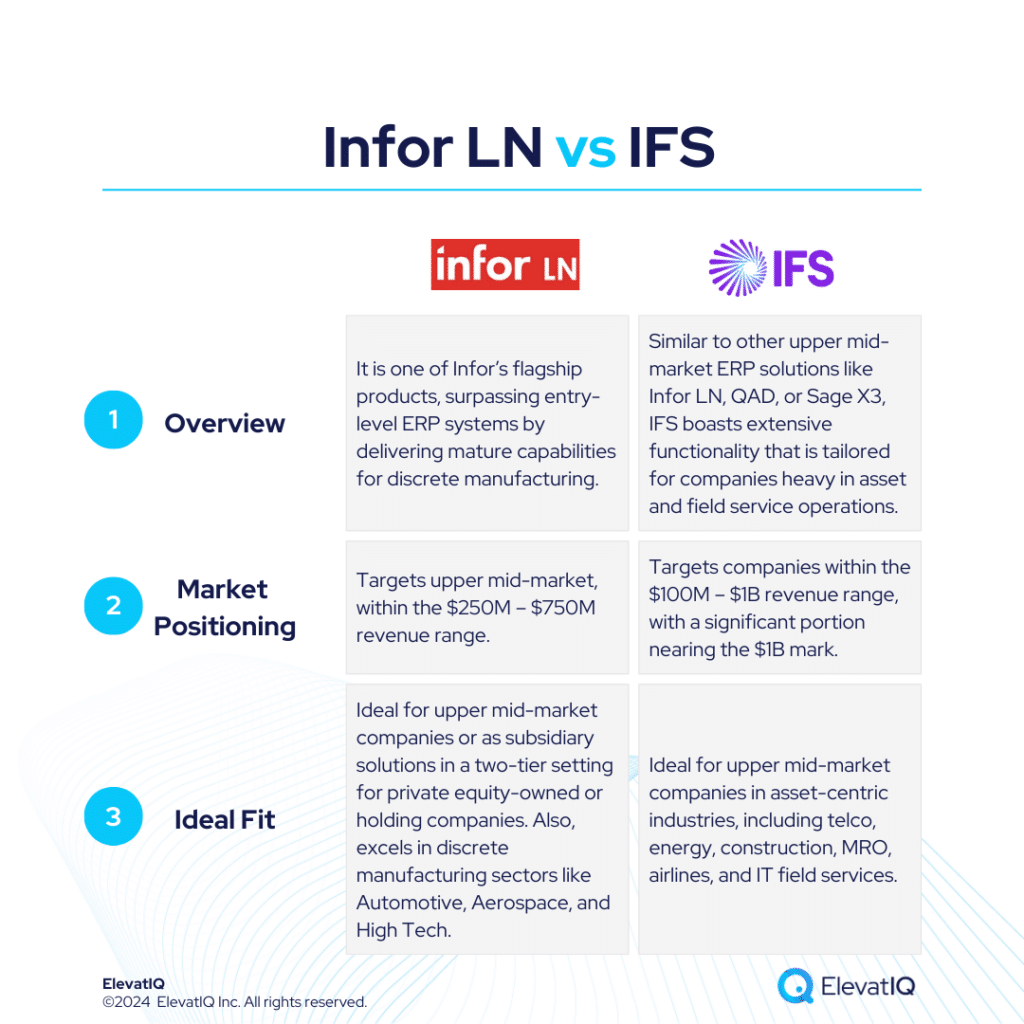

| Infor CloudSuite LN | IFS | |
| Started in | 2006 (when Infor acquired BaaN) | 1986 |
| Ownership by | Koch Industries | EQT |
| No. of customers | 1,000+ | 6,500+ |
What Is Infor CloudSuite LN?
Infor CloudSuite LN is a complete product suite to meet the needs of an enterprise particularly similar to Epicor, SAP, Oracle, or Microsoft. Infor is also perhaps the only vendor after the larger ones that has the capabilities to build best-of-breed architecture akin to SAP, Oracle, and Microsoft. In fact, Infor might have deeper capabilities than Microsoft in some areas with pre-integrated best-of-breed solutions such as Infor WFM and Nexus. Infor is also the only vendor that can provide depth in several industries while not struggling with the transactional processing requirements of large accounts.
Infor LN is ideal for particularly discrete manufacturing companies. It is also successful in the upper mid-market, targeting the $250M – $750M revenue range. Positioned for companies surpassing entry-level ERP systems like Acumatica, Infor CSI, or NetSuite, this solution also delivers mature capabilities for intricate manufacturing intertwined with distribution operations. Infor LN also provides a superior suite experience akin to SAP and Oracle, featuring enterprise-grade best-of-breed functionalities, including PLM, WMS, WFM, BI, and a supply chain collaboration platform.
While Infor LN excels in discrete manufacturing and offers a robust suite experience, it does face certain challenges in specific scenarios such as with process-centric operations for companies. They might also include business operations such as plastic or chemicals as part of their automotive operations. Despite limitations in broader capabilities compared to other vanilla solutions, recent upgrades acknowledge its broader application in various automotive business models.
What Is IFS?
Similar to other upper mid-market ERP solutions like Infor LN, QAD, or Sage X3, IFS also boasts extensive functionality. This functionality is particularly tailored for companies heavy in asset and field service operations. Positioned uniquely in the market, IFS also appeals to enterprises seeking mature, industry-specific capabilities, reducing the need for extensive development with vanilla ERP systems like SAP or Oracle. IFS serves as an optimal alternative in the upper mid-market space, offering standalone best-of-breed asset management and field service capabilities or a comprehensive ERP solution particularly crafted for asset-centric industries, including telco, energy, construction, MRO, airlines, and IT field services.
The IFS also data model surpasses the complexity of smaller systems like Acumatica or NetSuite, demanding an experienced internal team and external advisory support to successfully align process and data codings with the intricate IFS data model. It is an ideal choice for upper mid-market companies outgrowing smaller systems, such as Acumatica or NetSuite, and requiring mature capabilities for enterprise-wide asset scheduling and maintenance. IFS not only delivers functional capabilities but also efficiently manages the transactional workload of upper-mid-market companies.
IFS boasts robust global, multi-entity capabilities and also operates as a cloud-native solution. The majority of IFS customers particularly fall within the $100M – $1B revenue range, with a significant portion nearing the $1B mark. While IFS has its roots in Europe, they have been trying to grow its presence in North America. In 2023, IFS made strategic acquisitions to enhance its AI and shop floor capabilities.
Infor LN vs IFS Comparison
Navigating the choice between Infor LN vs IFS is a significant decision for businesses particularly looking for operational efficiency and strategic alignment. Thus, this section delves into the comprehensive comparison of Infor LN vs IFS across various critical dimensions.
| Infor CloudSuite LN | IFS | |
| Global Operational Capabilities | Has financial hierarchy layers and pre-baked global trade compliance functionalities. | Has robust global multi-entity capabilities. |
| Diverse Capabilities | Limited focus on certain business models. | Companies with a diverse business model, such as manufacturing or expecting changes with the model, might struggle. |
| Best-of-breed Capabilities | HCM, PLM, data lake, ERP, WMS, TMS, and advanced supply chain planning, are all pre-integrated. | Has one of the strongest field service and asset management capabilities. |
| Last-mile Capabilities | Present along with breadth of capabilities for diversified manufacturing business models. | Often require add-ons for specific micro-verticals. |
| Operational Functionalities | Legacy solution with limited cloud-native capabilities. | The operational capabilities would be deeper in some areas, making it a best-of-breed option for enterprise-grade asset and field service-centric use cases used alongside another ERP as a corporate ledger. |
| Integration Capabilities | Manufacturing tools, such as HCM, PLM, data lake, ERP, WMS, TMS, and advanced supply chain planning, are pre-integrated. | Good fit for those seeking best-of-breed field service capabilities for a subsidiary or integrated with a corporate financial ledger. |
| Manufacturing Capabilities | Mature capabilities for manufacturing and distribution operations. | Has comparatively limited manufacturing capabilities. |
| Pricing Model | Subscription-based | Recurring subscription-based model |
| Key Modules | 1. Financials 2. Human Resources 3. Manufacturing Management 4. Inventory Management 5. Purchasing Management 6. Quality Management 7. Sales Management 8. Product Technology | 1. Manufacturing 2. Supply Chain Management 3. Projects 4. Finance 5. Human Capital Management 6. Procurement 7. Customer Relationship Management 8. Commerce |
Infor LN vs IFS Feature Comparison
Both platforms offer a plethora of features and functionalities designed to streamline business operations and enhance efficiency. In this feature comparison, we delve into particularly the distinct capabilities of Infor LN vs IFS across various critical dimensions, providing insights to aid businesses in making informed decisions regarding their ERP selection. Thus, this section discusses features under each of the following modules, particularly financial management, supply chain management, and manufacturing management.
Financial Management Comparison
In this section, we are discussing a detailed comparison of the financial management capabilities particularly offered by Infor LN vs IFS. By examining their respective strengths and functionalities, particularly in managing financial processes. Businesses can therefore gain valuable insights to determine the best-suited ERP solution for their financial management needs.
| Infor CloudSuite LN | IFS | ||
| Financial Management | General Ledger | The General Ledger is the core component of Infor LN Financials, recording all transactions within the application that affect accounting. | Centralizes financial data management, enabling accounting, reporting, and analysis. |
| Accounts Receivable and Accounts Payable | AR manages customer invoices and credit, while AP handles supplier invoices and balance management. | Streamlines customer invoicing, payment processes, vendor invoices and payments. | |
| Cash Flow Management | Cash Management handles cash-related transactions, primarily involving payments to and receipts from business partners. | Enables accurate planning and forecasting of cash activities, and analyze liquidity and cash positions. | |
| Currency Management | The LN multicurrency systems allow a company to conduct accounting in multiple currencies, calculating and registering amounts in up to three currencies. | Handles transactions in multiple currencies, automatically calculating exchange rates and converting transactions into the base currency. | |
| Tax Management | Tax reporting is part of financial accounting and is limited to one country, so LN’s tax handling in a multicompany structure is similar to that in a single company environment. | Automates and manages tax calculations, compliance, and reporting across multiple jurisdictions. |
Supply Chain Management Comparison
In this comparison, we explore and analyze the supply chain management capabilities of Infor LN vs IFS, shedding light particularly on their respective strengths and weaknesses.
| Infor CloudSuite LN | IFS | ||
| Supply Chain Management | Warehouse Management | Warehousing focuses on managing and replenishing goods within a warehouse, including tasks to report and analyze inventory movements. | Enables businesses to efficiently manage warehouse operations by automating the physical storage and retrieval of inventory items. |
| Service Management | Manages the maintenance, repair, and overhaul of field-based and plant-based products, equipment, and systems. | Enables organizations to efficiently manage their field service operations, including planning, scheduling, dispatching, and mobile workforce management. | |
| Inventory Management | Can support complex inventory types including dedicated inventory masters for MRO or quality components for added granularity and control | Provides real-time visibility into stock movements, allowing businesses to maintain optimal inventory levels by setting reorder points and reducing the risk of overstocking and stock-outs. | |
| Purchase Order Management | Can create and modify purchase orders for purchasing goods. | Streamlines the procurement process by automating the creation, tracking, and approval of purchase orders, ensuring efficient and accurate order fulfillment. | |
| Sales Order Management | They are utilized to sell and deliver items or services to a sold-to business partner under specific terms and conditions, originating from various sources like Contracts, Quotations, EDI, and Planning. | Efficiently handles the entire sales order process from quotation to invoicing, ensuring accurate order fulfillment and real-time tracking across multiple sites. | |
| Requisition Management | Specifies nonsystem planned requirements for different types of items, including inventory items, cost items, and service items. | Simplifies the procurement process by allowing users to create, track, and approve requisitions, ensuring that all purchase requests are efficiently managed and fulfilled. |
Manufacturing Management Comparison
In this comparison, we explore and analyze the manufacturing management capabilities of Infor LN vs IFS, shedding light, particularly on their respective strengths and weaknesses.
| Infor CloudSuite LN | IFS | ||
| Manufacturing Management | Production Planning | One of the most robust production planning capabilities including advanced planning and scheduling capabilities for diverse manufacturing operations. | Optimizes manufacturing processes by providing tools for capacity planning, production scheduling, material requirements planning, and shop floor control, ensuring real-time visibility and efficiency. |
| BOM and Routing | It is stored as general item data for LN in Item Production Data (IPD). | Streamlines manufacturing by detailing the components and materials needed for production and defining the sequence of operations required to produce a finished product. | |
| Advanced Planning and Scheduling | Stores scheduling information for projects, allowing you to define project plans along with associated activities and milestones. | Enhances manufacturing efficiency by optimizing resource allocation, production schedules, and material requirements through advanced algorithms and real-time data analysis. |
Pros of Infor LN vs IFS
When evaluating ERP solutions, understanding the distinct advantages of Infor LN vs IFS is crucial. In this section, we are particularly exploring the strengths of Infor LN vs IFS across various dimensions. Thus, shedding light on their respective capabilities and functionalities.
| Infor CloudSuite LN | IFS |
| Ideal for upper mid-market companies or as subsidiary solutions in a two-tier setting for private equity-owned or holding companies. | One of the most consistent user experiences that have been rearchitected and modernized. |
| It can support the most complex manufacturing business models, WBS-centric manufacturing, or support for attributes with MRP planning. | One of the strongest asset-management capabilities for organizations with very thick asset and predictive maintenance needs. |
| Most tools that make-to manufacturer would require, such as HCM, PLM, data lake, ERP, WMS, TMS, and advanced supply chain planning, are all pre-integrated with LN. | Designed to handle large programs where consolidated visibility would be critical without ad-hoc arrangements. |
| While most smaller solutions might require ad-hoc arrangements for global financial operations, Infor CloudSuite LN has them natively built. | Unique financial workflows to support complex project manufacturing programs. |
Cons of Infor LN vs IFS
Just like recognizing strengths is important, it’s also crucial to weigh the specific drawbacks of Infor LN vs IFS. Therefore, in this section, we will delve into the limitations and challenges associated with Infor LN vs IFS across various operational and financial dimensions.
| Infor CloudSuite LN | IFS |
| The limited focus on certain business models poses the risk of requiring other ERP systems to support complex and diverse business operations such as process manufacturing or metal-centric A&D companies. | Has a limited presence in North America and also a lean partner ecosystem. |
| Private equity and holding companies requiring global solutions with a tier-2 solution at the subsidiary level might not be the best use of Infor LN’s strengths. | Companies with a diverse business model, might outgrow or struggle with the solution. |
| Infor LN is a legacy solution with limited cloud-native capabilities such as universal search, mobile experience, etc | Companies involved with the M&A or the ones part of the PE portfolio might also not be the best fit for IFS. |
| The consulting base and marketplaces are virtually non-existent for Infor LN. | IFS might not be the best fit to be used just as the corporate ledger particularly for large project manufacturing enterprises. |
Conclusion
In conclusion, both Infor LN vs IFS offer robust ERP solutions, each catering to distinct industry needs and operational complexities. Infor LN is well-suited for upper mid-market companies, particularly in the discrete manufacturing sector, offering mature capabilities that integrate manufacturing, distribution, and enterprise management. Its best-of-breed functionalities, such as PLM and WMS, position it as a comprehensive solution for businesses with intricate manufacturing and supply chain operations. However, it may face limitations in supporting highly diverse business models or process-centric operations, particularly in sectors like process manufacturing and complex A&D industries.
On the other hand, IFS excels in asset-centric industries like energy, telecom, and construction, delivering strong global and multi-entity capabilities tailored for field service and asset management. With a cloud-native architecture and emphasis on industry-specific solutions, IFS is particularly ideal for businesses that prioritize asset scheduling, maintenance, and complex service management. While IFS has its strengths in asset-heavy operations, it may not be the optimal choice for companies seeking a solution solely for corporate financial operations or those requiring a larger consulting ecosystem.
Both systems have their strengths and limitations, so businesses should carefully evaluate their specific needs and growth aspirations to determine the most suitable ERP solution. Also, seeking assistance from an independent ERP consultant can significantly aid the decision-making process. To get a 360-degree view of feature comparisons, it’s essential to explore not only Infor LN vs. IFS but also insights from other analyses such as Infor LN vs. NetSuite, SAP S/4 HANA, Oracle Cloud ERP, MS Dynamics 365 F&O, MS Dynamics 365 BC, Acumatica, Infor M3 and Epicor Kinetic.



